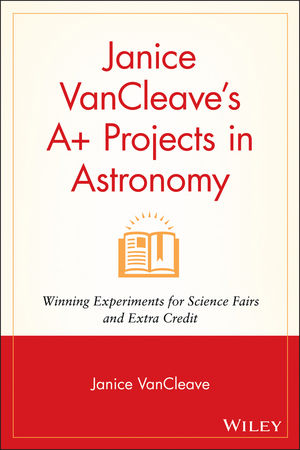Janice VanCleave's A+ Projects in Astronomy: Winning Experiments for Science Fairs and Extra CreditISBN: 978-0-471-32816-2
Hardcover
224 pages
November 2001
 Other Available Formats: Paperback
|
||||||
Introduction.
PART I. MEASUREMENTS.
Apparent Diameter: Observed.
Angular Separation: Angular Distance Between Celestial Bodies.
Altitude: Vertical Coordinate.
Azimuth: Horizontal Coordinate.
PART II. OPTICAL INSTRUMENTS.
Apertures: The Gathering of Light.
Diffraction: The Spreading of Light.
PART III. THE SUN.
Sunspots: Cooler Surface Regions.
True Sun: How the Sun Appears to Move.
Seasons: Four Times of the Year.
PART IV. THE PLANETS.
Solar System Scale: Miniature Model.
Barycenter: The Balancing Point.
Orbital Eccentricity: How Circular a Celestial Body's Path Is.
Planetary Phenomean: Planetary Movement Relative to Earth.
Orbital Period: Time of Revolution.
Spheroids: Bulging Bodies.
Rotation: The Spinning of Celestial Bodies.
Phases of Venus: Changes in Shape and Size.
PART V. MOONS.
Moon Phase: The Moon's Visible Lighted Surface.
Eclipses: Shadows of the Earth and Moon.
Craters, Maria, and Highlands: The Moon's Surface Features.
Galilean Satellites: Jupiters Largest Moons.
PART VI. STARS.
Celestial Sphere: Sky Globe.
Zodiac Band: Background for the Ecliptic.
Cirumpolar: Stars above the Horizon.
Star Clock: Star Positions Indicate Time.
Star Systems: Multiple Stars.
Apparent Magnitude: Apparent Star Brightness.
Parallax: Apparent Shift of an Object.
PART VII. METEORS AND ARTIFICIAL SATELLITES.
Meteors: Streaks of Light in the Sky.
Artificial Satellites: Man-Made Orbiters.
Appendix 1: Random Error of Measurements.
Appendix 2: Relative Error: Percentage Error.
Appendix 3: Planet Facts and Figures.
Appendix 4: Tangent Table.
Appendix 5: Sources of Scientific Supplies.
Glossary.
Index.
PART I. MEASUREMENTS.
Apparent Diameter: Observed.
Angular Separation: Angular Distance Between Celestial Bodies.
Altitude: Vertical Coordinate.
Azimuth: Horizontal Coordinate.
PART II. OPTICAL INSTRUMENTS.
Apertures: The Gathering of Light.
Diffraction: The Spreading of Light.
PART III. THE SUN.
Sunspots: Cooler Surface Regions.
True Sun: How the Sun Appears to Move.
Seasons: Four Times of the Year.
PART IV. THE PLANETS.
Solar System Scale: Miniature Model.
Barycenter: The Balancing Point.
Orbital Eccentricity: How Circular a Celestial Body's Path Is.
Planetary Phenomean: Planetary Movement Relative to Earth.
Orbital Period: Time of Revolution.
Spheroids: Bulging Bodies.
Rotation: The Spinning of Celestial Bodies.
Phases of Venus: Changes in Shape and Size.
PART V. MOONS.
Moon Phase: The Moon's Visible Lighted Surface.
Eclipses: Shadows of the Earth and Moon.
Craters, Maria, and Highlands: The Moon's Surface Features.
Galilean Satellites: Jupiters Largest Moons.
PART VI. STARS.
Celestial Sphere: Sky Globe.
Zodiac Band: Background for the Ecliptic.
Cirumpolar: Stars above the Horizon.
Star Clock: Star Positions Indicate Time.
Star Systems: Multiple Stars.
Apparent Magnitude: Apparent Star Brightness.
Parallax: Apparent Shift of an Object.
PART VII. METEORS AND ARTIFICIAL SATELLITES.
Meteors: Streaks of Light in the Sky.
Artificial Satellites: Man-Made Orbiters.
Appendix 1: Random Error of Measurements.
Appendix 2: Relative Error: Percentage Error.
Appendix 3: Planet Facts and Figures.
Appendix 4: Tangent Table.
Appendix 5: Sources of Scientific Supplies.
Glossary.
Index.



